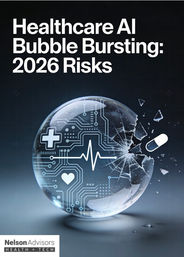Future of Natural Language Processing for Electronic Health Records
- Lloyd Price
- May 28, 2023
- 5 min read
Updated: Jun 19, 2024

Natural language processing (NLP) is a field of computer science that deals with the interaction between computers and human (natural) languages. NLP is used in a variety of applications, including machine translation, text classification, and sentiment analysis.
In the healthcare industry, NLP is increasingly being used to extract insights from electronic health records (EHRs). EHRs are digital representations of a patient's health history, including medical history, medications, allergies, and test results. EHRs are a valuable source of information for clinicians, but they can be difficult to use effectively.
NLP can be used to extract information from EHRs in a number of ways. For example, NLP can be used to:
Identify and extract clinical concepts, such as diagnoses, procedures, and medications.
Identify relationships between clinical concepts, such as the fact that a patient with a diagnosis of diabetes is also taking insulin.
Generate summaries of EHRs that are easier for clinicians to read and understand.
Identify patients who are at risk for certain conditions, such as heart disease or stroke.
NLP is a promising technology that has the potential to improve the quality of care in healthcare. By extracting insights from EHRs, NLP can help clinicians to make better decisions, improve patient outcomes, and reduce costs.
Mergers, Acquisitions, Growth and Strategy for Healthcare Technology companies in EMEA
Healthcare Technology Thought Leadership from Nelson Advisors – Market Insights, Analysis & Predictions. Visit https://www.healthcare.digital
HealthTech Corporate Development - Buy Side, Sell Side, Growth & Strategy services for Founders, Owners and Investors. Email lloyd@nelsonadvisors.co.uk
HealthTech M&A Newsletter from Nelson Advisors - HealthTech, Health IT, Digital Health Insights and Analysis. Subscribe Today! https://lnkd.in/e5hTp_xb
HealthTech Corporate Development and M&A - Buy Side, Sell Side, Growth & Strategy services for companies in Europe, Middle East and Africa. Visit www.nelsonadvisors.co.uk
Here are some examples of how NLP is being used in EHRs:
Identifying patients at risk for readmission. NLP can be used to identify patients who are at risk for being readmitted to the hospital within 30 days of discharge. This information can be used to target these patients with preventive interventions, such as home visits or phone calls, to reduce the risk of readmission.
Predicting patient outcomes. NLP can be used to predict patient outcomes, such as the risk of death or the need for surgery. This information can be used to guide clinical decision-making and help patients make informed choices about their care.
Improving communication between clinicians. NLP can be used to improve communication between clinicians by summarizing EHRs and highlighting important information. This can help clinicians to make better decisions and provide more coordinated care.
NLP is a rapidly evolving field, and new applications for NLP in EHRs are being developed all the time. As NLP technology continues to improve, it is likely to play an increasingly important role in the healthcare industry.

Electronic Health Records (EHRs)
Electronic Health Records (EHRs) contain a wealth of information about patients' medical histories, diagnoses, treatments, and other clinical data. NLP can be applied to EHRs to extract meaningful information from the unstructured text and enable various tasks such as:
Information extraction: NLP techniques can be used to extract specific pieces of information from EHRs, such as patient demographics, medications, allergies, laboratory results, procedures, and diagnoses. This extraction process helps in structuring the unstructured data and making it more accessible for analysis and decision-making.
Clinical coding: NLP can assist in automating the process of clinical coding, which involves assigning standardised codes to diagnoses, procedures, and medications. By analyzing the clinical text, NLP algorithms can suggest appropriate codes, improving coding accuracy and efficiency.
Clinical decision support: NLP can aid in developing clinical decision support systems by analyzing patient data in EHRs and providing relevant information to healthcare professionals. For example, NLP algorithms can flag potential drug-drug interactions, alert about allergies or adverse drug reactions, or provide relevant research articles based on a patient's condition.
Clinical research: NLP can be utilized to extract data from EHRs for research purposes. Researchers can analyze a large volume of clinical narratives to identify patterns, trends, and associations between different medical conditions, treatments, and outcomes. NLP can help automate the identification and extraction of relevant data for research studies, saving time and effort.
Natural language generation: NLP can be used to generate human-readable summaries or reports based on the information present in EHRs. This can help in creating concise and standardised summaries of patient encounters, progress notes, or discharge summaries, saving time for healthcare professionals and improving communication between providers
However, it's important to note that implementing NLP for EHRs presents some challenges. EHRs often contain noisy and unstructured data, with variations in language, abbreviations, and spelling errors.
Additionally, ensuring patient privacy and data security is crucial when working with sensitive medical information. Nonetheless, NLP continues to evolve and show promise in improving healthcare processes and outcomes by leveraging the wealth of information within EHRs.
Future of natural language processing (NLP) for electronic health records (EHRs)
The future of natural language processing (NLP) for electronic health records (EHRs) is bright. NLP is a rapidly developing field with the potential to revolutionize the way healthcare is delivered.
NLP can be used to extract insights from EHRs that would otherwise be difficult or impossible to obtain. For example, NLP can be used to identify patients who are at risk for certain diseases, to track patient progress over time, and to identify potential drug interactions.
NLP can also be used to improve the efficiency of healthcare delivery. For example, NLP can be used to automate tasks such as medical coding and billing. This can free up healthcare professionals to spend more time on patient care.
The use of NLP in healthcare is still in its early stages, but it has the potential to make a significant impact on the way healthcare is delivered. In the future, NLP is likely to be used to:
Improve the quality of care
Reduce costs
Improve patient safety
Increase patient satisfaction
NLP is a powerful tool that has the potential to revolutionize the way healthcare is delivered. As NLP technology continues to develop, it is likely to play an increasingly important role in healthcare.
Here are some specific examples of how NLP is being used in EHRs today:
Clinical decision support: NLP can be used to identify patients who are at risk for certain diseases or who may be experiencing adverse drug reactions. This information can then be used to provide patients with preventive care or to adjust their medications.
Patient education: NLP can be used to extract information from EHRs and create personalized educational materials for patients. This information can help patients understand their condition and how to manage it.
Research: NLP can be used to analyze large datasets of EHR data to identify trends and patterns that may not be visible to the naked eye. This information can then be used to improve the diagnosis and treatment of diseases.
These are just a few examples of how NLP is being used in EHRs today. As NLP technology continues to develop, it is likely to play an increasingly important role in healthcare.
Mergers, Acquisitions, Growth and Strategy for Healthcare Technology companies in EMEA
Healthcare Technology Thought Leadership from Nelson Advisors – Market Insights, Analysis & Predictions. Visit https://www.healthcare.digital
HealthTech Corporate Development - Buy Side, Sell Side, Growth & Strategy services for Founders, Owners and Investors. Email lloyd@nelsonadvisors.co.uk
HealthTech M&A Newsletter from Nelson Advisors - HealthTech, Health IT, Digital Health Insights and Analysis. Subscribe Today! https://lnkd.in/e5hTp_xb
HealthTech Corporate Development and M&A - Buy Side, Sell Side, Growth & Strategy services for companies in Europe, Middle East and Africa. Visit www.nelsonadvisors.co.uk




















































Comments